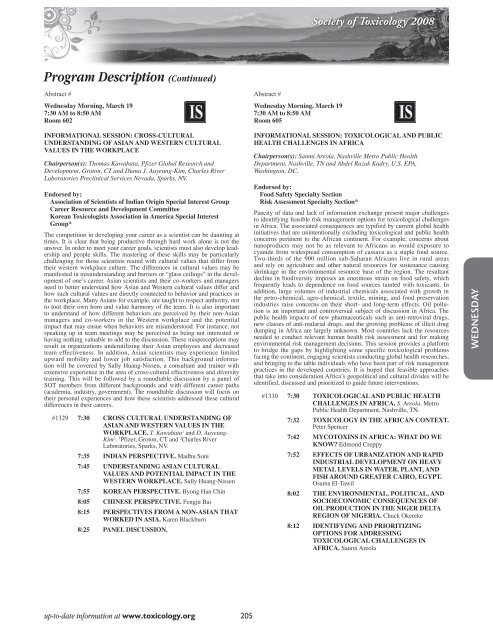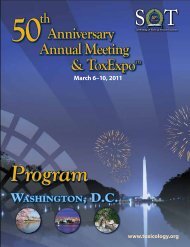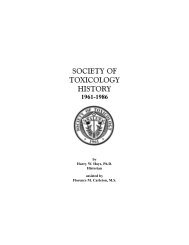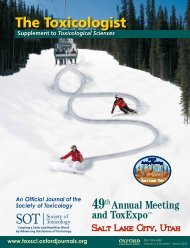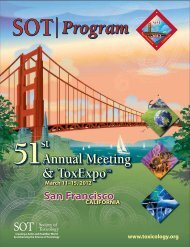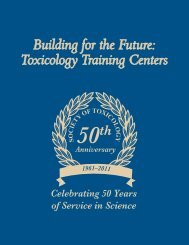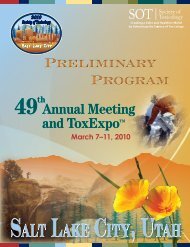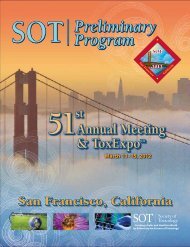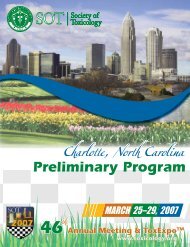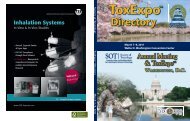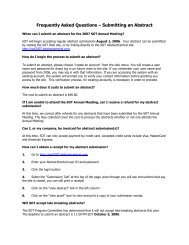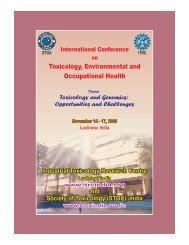Annual Meeting Program - Society of Toxicology
Annual Meeting Program - Society of Toxicology
Annual Meeting Program - Society of Toxicology
Create successful ePaper yourself
Turn your PDF publications into a flip-book with our unique Google optimized e-Paper software.
<strong>Society</strong> <strong>of</strong> <strong>Toxicology</strong> 2008<br />
<strong>Program</strong> Description (Continued)<br />
Abstract #<br />
Wednesday Morning, March 19<br />
7:30 AM to 8:50 AM<br />
Room 602<br />
Abstract #<br />
Wednesday Morning, March 19<br />
7:30 AM to 8:50 AM<br />
Room 605<br />
INFORMATIONAL SESSION: CROSS-CULTURAL<br />
UNDERSTANDING OF ASIAN AND WESTERN CULTURAL<br />
VALUES IN THE WORKPLACE<br />
Chairperson(s): Thomas Kawabata, Pfizer Global Research and<br />
Development, Groton, CT and Diana J. Auyeung-Kim, Charles River<br />
Laboratories Preclinical Services Nevada, Sparks, NV.<br />
Endorsed by:<br />
Association <strong>of</strong> Scientists <strong>of</strong> Indian Origin Special Interest Group<br />
Career Resource and Development Committee<br />
Korean Toxicologists Association in America Special Interest<br />
Group*<br />
The competition in developing your career as a scientist can be daunting at<br />
times. It is clear that being productive through hard work alone is not the<br />
answer. In order to meet your career goals, scientists must also develop leadership<br />
and people skills. The mastering <strong>of</strong> these skills may be particularly<br />
challenging for those scientists reared with cultural values that differ from<br />
their western workplace culture. The differences in cultural values may be<br />
manifested in misunderstanding and barriers or “glass ceilings” in the development<br />
<strong>of</strong> one’s career. Asian scientists and their co-workers and managers<br />
need to better understand how Asian and Western cultural values differ and<br />
how such cultural values are directly connected to behavior and practices in<br />
the workplace. Many Asians for example, are taught to respect authority, not<br />
to toot their own horn and value harmony <strong>of</strong> the team. It is also important<br />
to understand <strong>of</strong> how different behaviors are perceived by their non-Asian<br />
managers and co-workers in the Western workplace and the potential<br />
impact that may ensue when behaviors are misunderstood. For instance, not<br />
speaking up in team meetings may be perceived as being not interested or<br />
having nothing valuable to add to the discussion. These misperceptions may<br />
result in organizations underutilizing their Asian employees and decreased<br />
team effectiveness. In addition, Asian scientists may experience limited<br />
upward mobility and lower job satisfaction. This background information<br />
will be covered by Sally Huang-Nissen, a consultant and trainer with<br />
extensive experience in the area <strong>of</strong> cross-cultural effectiveness and diversity<br />
training. This will be followed by a roundtable discussion by a panel <strong>of</strong><br />
SOT members from different backgrounds and with different career paths<br />
(academia, industry, government). The roundtable discussion will focus on<br />
their personal experiences and how these scientists addressed these cultural<br />
differences in their careers.<br />
#1329 7:30 CROSS CULTURAL UNDERSTANDING OF<br />
ASIAN AND WESTERN VALUES IN THE<br />
WORKPLACE. T. Kawabata 1 and D. Auyeung-<br />
Kim 2 . 1 Pfizer, Groton, CT and 2 Charles River<br />
Laboratories, Sparks, NV.<br />
7:35 INDIAN PERSPECTIVE. Madhu Soni<br />
7:45 UNDERSTANDING ASIAN CULTURAL<br />
VALUES AND POTENTIAL IMPACT IN THE<br />
WESTERN WORKPLACE. Sally Huang-Nissen<br />
7:55 KOREAN PERSPECTIVE. Byong Han Chin<br />
8:05 CHINESE PERSPECTIVE. Fengju Bai<br />
8:15 PERSPECTIVES FROM A NON-ASIAN THAT<br />
WORKED IN ASIA. Karen Blackburn<br />
8:25 PANEL DISCUSSION.<br />
INFORMATIONAL SESSION: TOXICOLOGICAL AND PUBLIC<br />
HEALTH CHALLENGES IN AFRICA<br />
Chairperson(s): Sanmi Areola, Nashville Metro Public Health<br />
Department, Nashville, TN and Abdel Razak Kadry, U.S. EPA,<br />
Washington, DC.<br />
Endorsed by:<br />
Food Safety Specialty Section<br />
Risk Assessment Specialty Section*<br />
Paucity <strong>of</strong> data and lack <strong>of</strong> information exchange present major challenges<br />
to identifying feasible risk management options for toxicological challenges<br />
in Africa. The associated consequences are typified by current global health<br />
initiatives that are unintentionally excluding toxicological and public health<br />
concerns pertinent to the African continent. For example, concerns about<br />
nanoproducts may not be as relevant to Africans as would exposure to<br />
cyanide from widespread consumption <strong>of</strong> cassava as a staple food source.<br />
Two-thirds <strong>of</strong> the 900 million sub-Saharan Africans live in rural areas<br />
and rely on agriculture and other natural resources for sustenance causing<br />
shrinkage in the environmental resource base <strong>of</strong> the region. The resultant<br />
decline in biodiversity imposes an enormous strain on food safety, which<br />
frequently leads to dependence on food sources tainted with toxicants. In<br />
addition, large volumes <strong>of</strong> industrial chemicals associated with growth in<br />
the petro-chemical, agro-chemical, textile, mining, and food preservation<br />
industries raise concerns on their short- and long-term effects. Oil pollution<br />
is an important and controversial subject <strong>of</strong> discussion in Africa. The<br />
public health impacts <strong>of</strong> new pharmaceuticals such as anti-retroviral drugs,<br />
new classes <strong>of</strong> anti-malarial drugs, and the growing problems <strong>of</strong> illicit drug<br />
dumping in Africa are largely unknown. Most countries lack the resources<br />
needed to conduct relevant human health risk assessment and for making<br />
environmental risk management decisions. This session provides a platform<br />
to bridge the gaps by highlighting some specific toxicological problems<br />
facing the continent, engaging scientists conducting global health researches,<br />
and bringing to the table individuals who have been part <strong>of</strong> risk management<br />
practices in the developed countries. It is hoped that feasible approaches<br />
that take into consideration Africa’s geopolitical and cultural divides will be<br />
identified, discussed and prioritized to guide future interventions.<br />
#1330 7:30 TOXICOLOGICAL AND PUBLIC HEALTH<br />
CHALLENGES IN AFRICA. S. Areola. Metro<br />
Public Health Department, Nashville, TN.<br />
7:32 TOXICOLOGY IN THE AFRICAN CONTEXT.<br />
Peter Spencer<br />
7:42 MYCOTOXINS IN AFRICA: WHAT DO WE<br />
KNOW? Edmond Creppy<br />
7:52 EFFECTS OF URBANIZATION AND RAPID<br />
INDUSTRIAL DEVELOPMENT ON HEAVY<br />
METAL LEVELS IN WATER, PLANT, AND<br />
FISH AROUND GREATER CAIRO, EGYPT.<br />
Osama El-Tawil<br />
8:02 THE ENVIRONMENTAL, POLITICAL, AND<br />
SOCIOECONOMIC CONSEQUENCES OF<br />
OIL PRODUCTION IN THE NIGER DELTA<br />
REGION OF NIGERIA. Chuck Okereke<br />
8:12 IDENTIFYING AND PRIORITIZING<br />
OPTIONS FOR ADDRESSING<br />
TOXICOLOGICAL CHALLENGES IN<br />
AFRICA. Sanmi Areola<br />
Wednesday<br />
up-to-date information at www.toxicology.org 205


